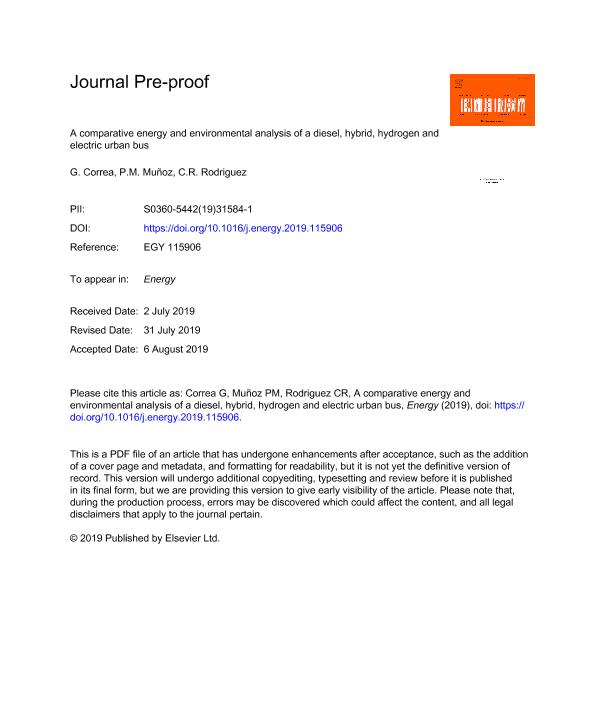Mostrar el registro sencillo del ítem
dc.contributor.author
Correa Perelmuter, Gabriel

dc.contributor.author
Muñoz, Pedro Matías

dc.contributor.author
Rodríguez, Carlos Ramiro

dc.date.available
2022-02-11T12:16:58Z
dc.date.issued
2019-11
dc.identifier.citation
Correa Perelmuter, Gabriel; Muñoz, Pedro Matías; Rodríguez, Carlos Ramiro; A comparative energy and environmental analysis of a diesel, hybrid, hydrogen and electric urban bus; Pergamon-Elsevier Science Ltd; Energy; 187; 11-2019; 1-29
dc.identifier.issn
0360-5442
dc.identifier.uri
http://hdl.handle.net/11336/151863
dc.description.abstract
In this work, a comparative analysis of energy and environmental performances, on four types of urban passenger buses powertrains was carried out within the well-to-wheel scope in Argentina, Chile and Brazil. The powertrains studied were: internal combustion engine fed with diesel, fuel cell hybrid electric vehicle fed with hydrogen, battery electric vehicle fed with electricity and hybrid electric vehicle fed with diesel. The aim of the study is to understand what the influence of the energy pathway, the electricity mix, the driving conditions and different ranges is, in the current and future deployment of urban passenger vehicles. We found that the electric vehicles are markedly superior in the tank to wheel step, nevertheless actions to improve their energy and environmental performance should focus on how to generate clean energy within the electricity mix and with what technologies. For the fuel cell powered buses to be competitive, the production share of hydrogen from wind or other zero emission technologies should be more than 50%. In Argentina and Chile, the buses with internal combustion engines are still an important alternative in the current scenario only for long ranges, instead Brazil turns out to be ideal the application of full electric buses.
dc.format
application/pdf
dc.language.iso
eng
dc.publisher
Pergamon-Elsevier Science Ltd

dc.rights
info:eu-repo/semantics/openAccess
dc.rights.uri
https://creativecommons.org/licenses/by-nc-nd/2.5/ar/
dc.subject
BATTERY
dc.subject
BUSES
dc.subject
EMISSIONS
dc.subject
ENERGY EFFICIENCY
dc.subject
HYDROGEN
dc.subject
WELL-TO-WHEEL
dc.subject.classification
Otras Ingeniería Eléctrica, Ingeniería Electrónica e Ingeniería de la Información

dc.subject.classification
Ingeniería Eléctrica, Ingeniería Electrónica e Ingeniería de la Información

dc.subject.classification
INGENIERÍAS Y TECNOLOGÍAS

dc.title
A comparative energy and environmental analysis of a diesel, hybrid, hydrogen and electric urban bus
dc.type
info:eu-repo/semantics/article
dc.type
info:ar-repo/semantics/artículo
dc.type
info:eu-repo/semantics/publishedVersion
dc.date.updated
2022-01-25T15:07:36Z
dc.journal.volume
187
dc.journal.pagination
1-29
dc.journal.pais
Estados Unidos

dc.description.fil
Fil: Correa Perelmuter, Gabriel. Consejo Nacional de Investigaciones Científicas y Técnicas. Centro de Investigaciones y Transferencia de Catamarca. Universidad Nacional de Catamarca. Centro de Investigaciones y Transferencia de Catamarca; Argentina. Consejo Nacional de Investigaciones Científicas y Técnicas; Argentina
dc.description.fil
Fil: Muñoz, Pedro Matías. Consejo Nacional de Investigaciones Científicas y Técnicas. Centro de Investigaciones y Transferencia de Catamarca. Universidad Nacional de Catamarca. Centro de Investigaciones y Transferencia de Catamarca; Argentina
dc.description.fil
Fil: Rodríguez, Carlos Ramiro. Universidad Nacional de Córdoba. Facultad de Matemática, Astronomía y Física; Argentina. Consejo Nacional de Investigaciones Científicas y Técnicas; Argentina
dc.journal.title
Energy

dc.relation.alternativeid
info:eu-repo/semantics/altIdentifier/url/https://www.sciencedirect.com/science/article/abs/pii/S0360544219315841
dc.relation.alternativeid
info:eu-repo/semantics/altIdentifier/doi/https://doi.org/10.1016/j.energy.2019.115906
Archivos asociados
